- Home
- Belva Plain
Tapestry Page 7
Tapestry Read online
Page 7
“You forget, I understand currency. I’m a banker.”
“Paul is right.” Elisabeth spoke eagerly. Her pale eyes shone. “The right wing doesn’t want the republic to work. That’s why they killed Walter Rathenau—such a brilliant man, a friend of my father’s—because he was trying to make the Weimar government work. And also because he was a Jew. That’s why.”
“You exaggerate,” Joachim said. “You have always had an exaggerated fear of anti-Semitism. You see it everywhere. It’s foolish and it’s bad for your health, Elisabeth.” His anger having exploded and died, he pushed his chair back. “Come, let’s have our coffee in the drawing room,” and for the second time that evening, he added, “We must talk of happier things. This is no occasion for such serious talk. Go, darling, tell Jeanne to bring Regina in to say good night.”
The silver coffee service stood on a table between the windows. Elisabeth poured coffee into Meissen cups. They were very old and very precious, Paul saw. Lately, he had been learning about porcelains. There were more little cakes, iced petit fours; he wanted to refuse them, but did not, for they had so obviously been prepared in his honor. So he ate, exclaiming over the cups and the cakes. This was safer ground than politics.
Then the child was brought in. Two years old and readied for bed, in her ruffled pink robe and little slippers, with her apple face flushed from her bath, she was enchanting. She held a doll upside down and insisted that everybody, including Paul, must kiss it good night. Her dark eyes, resembling neither parent’s, gleamed with intelligence and mischief. When the parents called the nursemaid back to take her away, Paul understood that they were caught between a wish to show her off before him and a fear of boring him with their adoration.
“Regina is learning French. The governess is French,” said Elisabeth. “We want her to know many languages. She must grow up to be a citizen of Europe.”
Joachim smiled. “My Elisabeth is a visionary. Regina is a citizen of Germany and that’s good enough. However, it’s not a bad idea to know languages.”
Then Joachim told two anecdotes about his little girl, quoting her comical remarks, which reminded Paul that he, too, could produce an anecdote, so he told about the day he had taken Hank to Central Park and Hank had asked a bald man what had happened to his hair.
“He’s a tough little fellow, smart and strong,” he concluded, and was suddenly aware that he had been speaking as though Hank were his child. Feeling rather foolish, he explained, “You see—I’ve felt a special concern for him because of Freddy.”
“You told me you have pictures,” Joachim said.
“Snapshots. They’re not very good, but they’ll give you some idea of your American relatives.”
He drew an envelope from his breast pocket and laid a sheaf of photos fanwise on the table. “Here, these are my parents. Here’s Hennie, that’s my mother’s sister, the one who is very political. She’s on every peace committee you might think of.”
“Wonderful!” exclaimed Elisabeth. “I’d like to know her. Yes, she has a serious face.” For Hennie, who had always been uneasy in front of a camera, was staring soberly into its eye.
“And here’s my uncle Alfred, Alfie we call him, standing on the porch of his country house. That’s Meg with him, his daughter; this was taken a few years ago, she’s quite grown up now, away at college, the university, as you say.” A thought fled across Paul’s mind, something uncomfortable, and for a second he strove to place it … oh, it was Meg with that Powers fellow the day he brought Dan home … and he resumed, “Here’s Hank. He’s seven now. He’s with his grandfather Dan. Don’t they look alike? And now here’s Leah. I took her picture the day she opened her new shop, the light’s not very good, but—”
Leah had been caught in the middle of a laugh, showing her even teeth; a collar of silk petals circled her neat head.
“Oh, isn’t she pretty!” Elisabeth cried.
“She really isn’t. She’s very fashionable and bright and friendly, so that one likes to look at her. And one likes her, too,” Paul added hastily. “Everyone does.”
“This is so nice,” Elisabeth said. “I’m beginning to know these people. Now let’s see the most important one, your wife.”
Paul shuffled through the snapshots. He looked again in the envelope. “I don’t seem to see it.” He looked on the floor. “Could I have dropped it someplace?” He was flustered. Was it possible that he hadn’t brought it with him? He tried to recall the evening when he had packed his bags and selected the photos. He could remember clearly how he had sorted through the box into which they had been tossed helter-skelter, and had selected the best ones to take along. Could he really have omitted Marian? He felt heat rising to his face.
“You must have dropped it,” Elisabeth said. “I’m sure you’ve been showing it all over London and Berlin.”
“I must have. I’ll send you one when I get home. Now tell me about all of you,” he said hurriedly. “Your sister’s married, Joachim?”
“Yes. They live in Berlin.”
And Joachim went on to tell about the distinguished family of which she was now a member, collateral descendants of Moses Mendelssohn. They had been prominent in the Kaiser’s circle, an honor accorded, as Paul must know, to very few Jews. And so forth.
Presently Elisabeth got up and excused herself. “Good night. It’s early yet, but I’m suddenly quite sleepy.” She kissed Joachim on the lips; the kiss lingered a moment longer than a perfunctory one and Joachim’s arms held her a moment longer than in a perfunctory embrace.
“She’s pregnant,” he explained, when she had left the room. “She gets tired at the end of the day.”
“She’s charming, Joachim.”
“We were engaged all through the war. She is what kept me going. And still does.” Joachim’s eyes were moist and shining. “I cannot imagine life without her,” he said simply.
Paul looked away. “You’re very lucky,” he murmured, and, swallowing a lump that seemed to be forming in his throat, heard himself say, “My wife had an operation. We can’t have any children.”
Joachim shook his head. “No children,” he repeated.
Something about the other man’s moist eyes and the way he had kissed his wife gave Paul a crazy desire to confide, I, too, have a woman I don’t want to live without. On my wedding night I thought of her while I lay with my wife.
He stifled the desire. Joachim was looking at him curiously.
“You’re tired too,” he said. “It’s been a long day on the train. Come to bed.” He stood up. “I’m sorry if I got too excited about the war and all that business. Forgive me.” He laid his arm around Paul’s shoulders. “It will take a little longer before we can all calm down and forget it.”
It was pleasant to have no responsibilities for the next few days. After completing the business calls he had to make in the city, Paul was free. In the evenings, his hosts took him about: one night to the National Theatre, and on another to the Hofbrauhaus, a vast, dim columned hall in which hundreds sang and swayed and drank. A cathedral of beer, Paul thought, disturbed by a rowdy quality that he would have found hard to describe.
Always in foreign cities, he loved to walk alone, satisfying his curiosity, getting the pulse of a place. Landing in Hamburg, the first thing he had observed was the silence in the commercial streets, with their vacant shops and factories. Cars in show windows had no tires; five years after the war, there was still no rubber in Germany. And there were so many amputees, so many shabby men wearing the jackets of their uniforms because they obviously couldn’t afford new clothes. And everywhere there was the silence.
Here in Munich, the food stores were fairly empty; he had read, before leaving America, that there was a shortage of soap in Germany, and so had brought a supply for the family. As soon as he got home, he would send them a package of canned goods.
In desperation, people were selling their valuables. Joachim had told him about an art dealer in the Schwabing section who hand
led a good many distress sales. On the second morning, Paul went there, and recognized it as the building in which, on one halcyon summer day before the war, he had bought Expressionists, two Kirchners and a Beckmann. To his surprise, the old proprietor remembered him, too.
“We don’t get—excuse me—too many Americans who know as much about paintings as you do,” he said.
Paul let the slur—if it had been a slur—go by. The man’s jacket was seedy and his eyes were sorrowful; quite possibly he was hungry.
“We have some good things from the finest homes,” he assured Paul hopefully.
Paul walked around the little gallery. There were a few Postimpressionists. One, a small Cézanne view of a road cut through yellow fields in evening light, was very much like the one that he and Anna had seen at the Armory Show, where he had taken her that first winter, the very first time they had gone anywhere together.
“A lovely piece,” the old man said, seeing him hesitate.
“Yes, lovely.”
But something else had caught his eye. A woman, copper-haired and enormously pregnant, lay nude against a pile of red and violet, jewel-bright Persian pillows.
“You don’t want that, Herr—Werner, you said? It’s only an imitation of Gustav Klimt. The artist was wounded and I feel sorry for him, but that’s not a painting for a man of taste like you.”
“Yes, I know it’s a copy.” The woman had a trace of a smile on her lips and in the corners of her eyes; this gave to the well-bred face an expression both secretive and hopeful.
The longer he looked at her, the more the woman “spoke” to him. She didn’t really look like Anna, except for the hair. And Marian would certainly find her offensive in her nudity, with that huge belly, so relaxed, so pleased with herself. Well, he would just hang it in his dressing room and she wouldn’t have to look at it.
“I really want this,” he said, and feeling a need to explain, added, “I buy whatever appeals, good or not so good.”
Having made arrangements for shipping, he went out into the morning, feeling the contentment that comes with getting something one wants. He stopped to buy a newspaper and walked on away from the center of the city. The day was gray and still, except for sparrow twitter. In this section, all was orderly. Here Germany, although vanquished, was undamaged, and looking through tall wrought-iron gates at fine villas and formal flowerbeds, bare now in November, he felt a rush of anger. In France, the villages had been shattered and the houses burned; he had a vivid recollection of a street, the usual single street in the usual village, with the houses strung like beads on either side; there had been an empty baby carriage in front of a house half blown away, and a dead dog lying next to it with a ribbon in its hair.
And yet, a moment later, when two young women passed him, wheeling baby carriages he thought: It isn’t their fault. All those atrocity reports are propaganda; these young Germans are no different from any on the other side.
He looked at his watch and, finding that it was early, sat down to observe the view. Green tiled roofs ascended the rise. In summer they would be hidden in an ocean of trees. The scene was a gentle one and pleased him. He felt relaxed. Then he opened the newspaper, the Völkischer Beobachter, and began to read.
“We must abrogate the Treaty of Versailles.” Well, Joachim would certainly agree to that! “Germany must be unified with all German-speaking peoples, the Sudetenland and the Austrians, into a strong Nationalist Greater Germany.” Very possibly Joachim would like that, too. “This republic is a disaster. We need a dictator who will restore order.” Paul read on. “There are no morals in the cities … the foreigners, the Jews have bastardized us … they have dirtied the soul of the people … it is the common wisdom of the peasant that has made us and has kept us healthy.”
Paul put the paper down. What—what filth! Rot! He picked it up and read it again. Was this perhaps some monstrous, crazy joke, a satire, a parody?
No, it was desperately and passionately in earnest. “The November criminals,” he read, “most of them Jews, who made the republic—”
Not even true. Most of them were not Jews, although it was to their credit, it was a brand of honor, that some of them were. And he sat quite still, looking out upon the friendly landscape, while his pulse beat audibly in his ears. After a while he got up and still with that pounding pulse and core of cold fear in his chest, he walked slowly back to lunch.
He presented Joachim with the paper. “I can hardly believe what I read in here.”
Joachim seemed to be amused. “Good Lord! Whatever made you buy a rag like that?”
“I didn’t know. How would I know? I wanted a paper.”
“A stupid rag. A gossip sheet.”
“That’s what you call it?”
“Certainly. A lot of down-and-outers, that’s all. They’re bitter and they have to blame somebody.”
“They’re not all down-and-outers,” Elisabeth interjected. “I’ve been listening to some women at my hairdresser’s. Very wealthy women. They’ve been contributing, or talking about friends who contribute. They say this fellow Hitler has very influential friends, some of them in the army, too.”
“Nonsense! He’s a Socialist,” Joachim argued. “He talks about profit sharing, doing away with land rents. Why should wealthy people support ideas like those?”
“Because nothing will come of them if he ever gets power. He doesn’t mean them and they know it,” Elisabeth said.
Joachim buttered his bread. “It will all pass as soon as they have jobs,” he assured them, “when the factories open and things pick up. In the meantime, it’s stupid to pay attention to such drivel.”
Neither Paul nor Elisabeth replied.
Letters came via American Express. As usual, Paul’s father had last-minute instructions, calk for him to make in Hamburg before taking his ship home. From Hennie came a cheerful letter telling him that it was hard to keep Dan indoors, the weather was terribly cold, fortunately the Red Scare was over with and real American decency had prevailed. She enclosed a note from Hank, who sent his love in printed letters, three words and his name.
Meg wrote in some distress. She had been seeing Donal Powers, but her parents didn’t like him. Her father thought he was “fast,” which Meg didn’t understand, because he had visited Laurel Hill and was such a gentleman. Her plea leapt from the page: When you get home, will you talk to them?
She’s gone on him, Paul thought, and felt sorry for women, who had to wait passively, hoping to be chosen; to be unmarried at twenty-five was a humiliation and at thirty, a disaster. So Meg, a senior at college, was already starting to worry. Poor girl! Nothing came easily to her. Was it possible that Powers was serious? Or that Meg herself knew enough to be serious? And, puzzled by indefinable misgivings, Paul frowned. Then, reading her childish postscript, he had to smile again. “If it’s not too much trouble, will you bring me a Black Forest cuckoo clock? I’ll pay you for it.”
“Good news from home? That’s nice,” said Joachim, who had been waiting while Paul read his mail. “I’ll tell you what, you’ve only a couple of days left, so I’m not going to work tomorrow. We’ll have a morning walk and then lunch with an old friend who wants to see you.”
They walked along the banks of the River Isar. It was another day of winter thaw. A little wind swayed through the bare trees and the sky was like blue water.
“You should see it when the chestnuts bloom, the great white flowers. And the lindens, and the swans in summer. It’s a beautiful city.” Joachim spoke dreamily. “A beautiful country.”
“Everyone thinks his country is beautiful,” Paul said kindly.
Innocence beamed in his cousin’s face. A good-hearted fellow, so simple in spite of all his culture and graduate degrees! He could do with a little worldly skepticism. His young wife was far more clever than he, although he undoubtedly didn’t know it. So he would finish, one could safely predict, in some prosperous enterprise owned by his wife’s family, where he would work honestly an
d well.
In European fashion, Joachim linked his arm with Paul’s. “Think, if your great-grandmother hadn’t gone to America, you might have grown up right here on one of these streets too.”
A thought struck Paul: We affect the future of those who come after us almost as much as we affect our own. And then: But there is no one coming after me.
“Today is the anniversary of the proclamation of the Weimar Republic,” Joachim said. “There’ll be parades in town. I’m not sure what time. Anyway, we have to head toward town for lunch.”
Crossing the Hofgarten, between rows of formal clipped greens, Paul felt the palatial nineteenth-century atmosphere. Presently, they heard brassy, martial music.
“The parade already?” Joachim was puzzled. “Come, they’ll be around here. We’ll get a better view farther in.”
Pleased as a little boy, he hurried, urging Paul with him until, turning a corner into an open street, they came abruptly upon a crowd that must have been collecting for some time. The two men, caught up in it, were pushed on farther as it streamed toward the mounting blare of the music. From every side street came people in swarms, converging.
There were men and women, young and old, family people carrying little children, all running now with an air of excitement, an air of holiday jubilation, toward some central destination. Some of them were even singing.
The music was upon them. Surely by accident, Joachim and Paul had been shoved to a perfect vantage point along the curb, where they had a clear view of the approaching parade. Down it came, and it was an astonishing sight.
A column of men in brown shirts wound as far back as one could see. They carried guns. Light flashed on their bayonets. Their arms and feet swung together in cadence. Their banners swayed; red, white, and black, they were, with the swastika prominent on high, as on the bands around each man’s upper arm. Paul, recognizing the hooked cross, an ancient design, out of Egypt and China and Hindu India, could only wonder what it meant. And why the weapons?
They were singing. “Germany wake up” or “Arise,” went the refrain, or something like that. Then, as the sections wound past, segmented like some long, creeping insect, he distinguished out of the general roar of voices a sprightly refrain: “When Jewish blood spurts from the knife.”

 The Golden Cup
The Golden Cup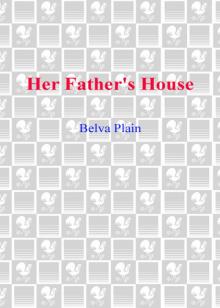 Her Father's House
Her Father's House Whispers
Whispers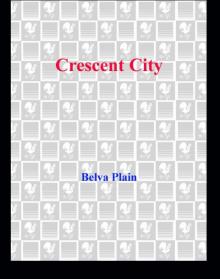 Crescent City
Crescent City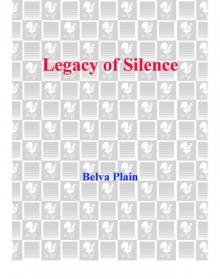 Legacy of Silence
Legacy of Silence Crossroads
Crossroads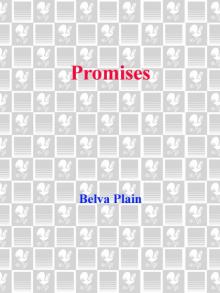 Promises
Promises After the Fire
After the Fire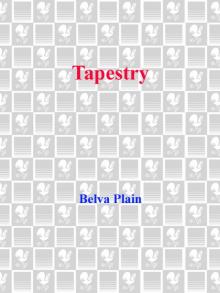 Tapestry
Tapestry Looking Back
Looking Back Heartwood
Heartwood The Carousel
The Carousel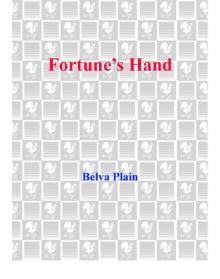 Fortune's Hand
Fortune's Hand Homecoming
Homecoming Random Winds
Random Winds Harvest
Harvest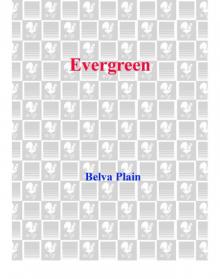 Evergreen
Evergreen Treasures
Treasures The Sight of the Stars
The Sight of the Stars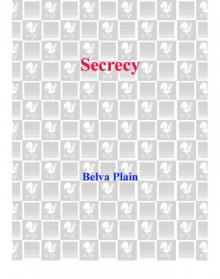 Secrecy
Secrecy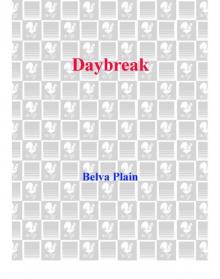 Daybreak
Daybreak Eden Burning
Eden Burning